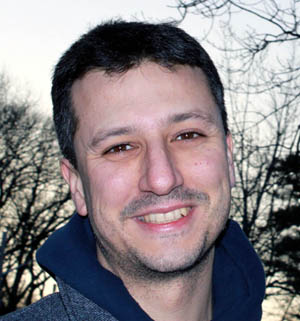
Paris Papamichos Chronakis
Three years after helping Aristotle University of Thessaloniki become a Visual History Archive access site in Greece, Paris Papamichos Chronakis will continue his relationship with the USC Shoah Foundation by presenting at its international conference in November.
Chronakis, currently at the University of Illinois, recently completed a visiting professorship in Brown University’s history department. He received his Ph.D. in Modern Greek and European History from the University of Crete and was a Rothschild Foundation Europe post-doctoral teaching fellow at the University of Thessaly. Chronakis is also a co-founder of the Group for the Study of the History of the Jews of Greece in which he and other scholars used hundreds of Visual Hsitory Archive testimonies among other sources to develop the online Database of Greek-Jewish Holocaust Survivors' Testimonies, a searchable, integrated database of all existing Greek-Jewish Holocaust survivor testimonies.. His research interests include the history of the Sephardim and Greek Orthodox in the 19th and 20th centuries and the history of the Mediterranean middle classes.
After working with USC Shoah Foundation’s research department to set up full access to the Visual History Archive at Aristotle University of Thessaloniki, Chronakis gave a lecture about his research of Greek Jewish Holocaust survivors to staff in 2012 while he was a visiting research scholar at UCLA.
Chronakis will present his research at the “Social Engagements with Holocaust Remembrance in New Media” panel at the Memory, Media and Technology: Exploring the Trajectories of Schindler’s List conference at USC Nov. 16-18. His paper, co-written with Jean Bauer, is Bonds of Survival: Reconstructing the Social Networks of Holocaust Survivors.
While he is not a Holocaust historian or digital historian by training, Chronakis said, he became increasingly interested in these fields over the last few years. At Brown, he collaborated with undergraduate students and Bauer, a Brown librarian, to develop a program to visualize the networks that Holocaust survivors from Saloniki developed in Auschwitz, drawn from hundreds of testimonies in the Visual History Archive.
The project aims to explore survivors as groups rather than isolated individuals, who formed relationships and networks while interned in concentration camps that may have helped them survive.
“I thought presenting this kind of work to the conference would be a great opportunity to interact with other scholars, expose it to critique and further suggestions and take it further,” Chronakis said.
Chronakis said he believes digital technologies will expand the field of Holocaust studies and that the conference comes at a “critical moment,” as most survivors have passed away and technology is often the only means scholars and the public have to interact with the Holocaust.
“At the same time, the nature of [the Holocaust] makes us increasingly question, in a very critical and formative, creative way, the uses that technology can be put into and the ways we can use it. It probes not only the limits of our interpretation, it probes us to critically rethink the limits of the tools in our means to do research,” he said.
The conference will offer an opportunity for the attending scholars to think critically about how technology can be used to study the Holocaust and gain a deeper understanding of its human aspects, especially the experiences of marginalized groups like Greek or Sephardic Jews, he said.
Chronakis hopes to gain an introduction into the expanding field of genocide studies and the work currently being done. But he’s more interested in the new questions he’ll come away with than the answers he might receive, since digital technologies are quickly becoming so vital to the study of the Holocaust.
“Technology democratizes the field, in my view,” he said. “It allows us not just to interact with the broader public, but to engage with its history, its own concerns, its own uses of the material and therefore be more aware of the many different lives and trajectories of the Holocaust as a field in our everyday world.”